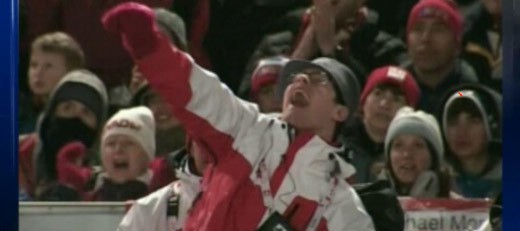So the Olympics are over. While I remain somewhat uncomfortable with the games in general, wondering if we could possibly convince the impartial outside observer that they are anything other than religion, I cannot deny that they pull together the nation in a completely unique way. Already I can see that the Olympics were good for Canada.
There were lots of great stories coming out of the Olympics. We saw Joannie Rochette win a bronze medal in an event held just days after the sudden death of her mother. We saw Clara Hughes win a bronze medal in long track speed skating, putting an exclamation mark and the end of her career as the only athlete in history to win multiple medals in both the summer and winter games. Last night we witnessed the men’s hockey team win a medal that will be talked about in Canada for years and years to come–an overtime goal that claimed for our country a gold medal in Canada’s own game. Overall we saw Canada win the greatest number of gold medals any nation has claimed at a Winter Olympics.
But there is one story that is going to remain with me more than the others, I’m convinced. Coming into these games, Canada had twice hosted an Olympics but had never won a gold on home soil. That all changed when Alexandre Bilodeau skied the greatest moguls event of his life (his name is pronounced ahl-ehx-AHN-druh BEEL-oh-doh – let your inner French Canadian come out and try saying it). In one of those great new Olympic sports they’ve added in recent years, he dominated, pulling out all the stops, combining heart-stopping jumps with incredible speed. He won the gold and Canada celebrated. Bilodeau went from an unknown to a national hero. You can with the video of his performance here.
But there was more to the story. Alexandre has a brother named Frédéric. Frédéric has cerebral palsy and, as his brother became the face of the nation, Frédéric became the face of cerebral palsy. Alexandre says that his brother is his inspiration, that when he does not want to climb out of bed in the morning to face another day of training, he thinks of his brother, confined to a wheelchair and barely able to talk, and there he finds motivation to work hard. And Frédéric finds great joy in his brother’s success. As his brother won his gold medal, the camera kept going to Frédéric, celebrating with his arms raised high in celebration, his mouth agape. It was a moment of pure joy.

Here are brothers who deeply love one another. Here are brothers who inspire one another and, in their own way, inspire anyone who watches them. On that day they inspired a whole nation.
 Two things stand out. First, I loved seeing disability in prime time. There was a time when everyone knew a child or two who had a significant disability. But today, in the age of abortion, most disabled children are eradicated before birth. Disability of this kind is rare and it was so good to see it featured both prominently and positively. And second, I loved seeing the love between brothers, brothers who are so different in ability and yet equal in their love for one another. Watch the videos of Frédéric and you’ll see that he won the gold medal just as much as his brother did.
Two things stand out. First, I loved seeing disability in prime time. There was a time when everyone knew a child or two who had a significant disability. But today, in the age of abortion, most disabled children are eradicated before birth. Disability of this kind is rare and it was so good to see it featured both prominently and positively. And second, I loved seeing the love between brothers, brothers who are so different in ability and yet equal in their love for one another. Watch the videos of Frédéric and you’ll see that he won the gold medal just as much as his brother did.
Last night I played and replayed the video of Sidney Crosby, seeing how he managed to get the puck in the net from a tough, tough angle. That memory will stay for a long time. But honestly, I much prefer the video of the Bilodeau brothers. As I watch Alexandre’s win, time and time again, I think of the words of Proverbs 18:24: “A man of many companions may come to ruin, but there is a friend who sticks closer than a brother.” Though those two boys love one another so much, I hope and pray for each of them that they come to know the One who sticks closer than even the most committed, most loyal brother.










